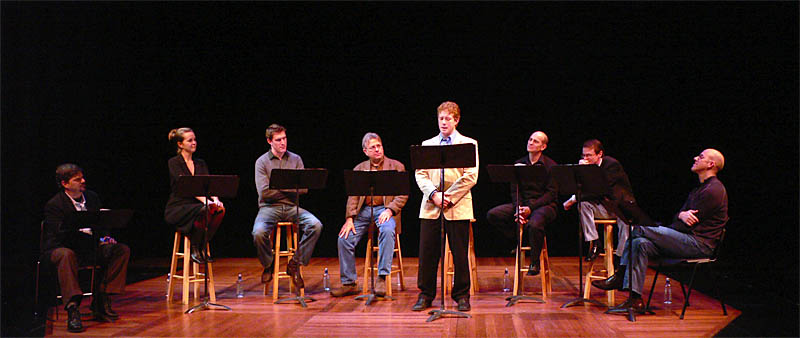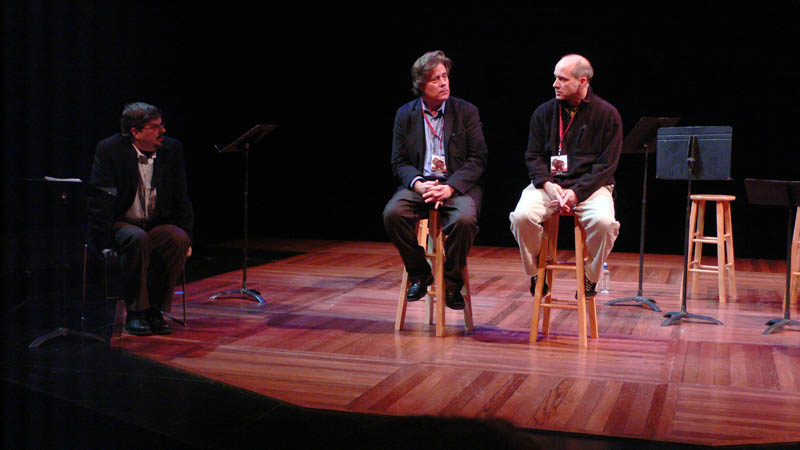Across the board, in Senate, House and Governor’s races, the wave boosting the Democrats crested about 10 days ago. Since then the advantage Democrats have built throughout the year has been reduced by from 1.5 to 3.5 percentage points. While forces are still a net positive to the Democrats, these forces are weaker than they were during the week before Halloween. This implies that the most competitive races will now be harder for Democrats to win and easier for Republicans to hold. This implies that the anticipation of a major surge to Democrats now needs to be reconsidered. While race-by-race estimates still show an 18 seat Democratic gain, and 27 seats as tossups (see our scorecard at Pollster.com here), this reduction in national forces makes it less likely the Democrats sweep the large majority of the tossup seats and could result in total gains in the 20s rather than the 30s or even 40s that looked plausible 10 days ago.
Monthly Archives: November 2006
Five Best Weather Books
1. The Elements Rage by Frank W. Lane (Chilton, 1965).
What interests most people about weather (as opposed to climate–“Climate lasts all the time and weather only a few days,” as Mark Twain put it) is its extremes and curious phenomena. Frank Lane clearly had that in mind in the early 1960s when he undertook writing “The Elements Rage.” Even if the science here is out of date, the drama of the stories never grows old. The book offers dozens of extraordinary black-and-white photographs and a fact-packed text, rich in anecdotes on matters well beyond meteorology–earthquakes, tsunamis, avalanches, volcanoes. As an inspiration toward appreciating how strange the natural world can be, the book set a standard that others, including myself, have attempted to emulate.
A Chat with JetBlue’s David Neelman
With Washington often, umm, unable to focus–“It took 10 years to get an energy bill passed that has had little effect,” Mr. Neeleman interjects–he sought counsel on the capital’s ways. As a result, he got professional help on the bill’s language and learned about the legislative process. “The advice I got was to go get RAND and other thinkers to write about it–those are the guys that they listen to,” Mr. Neeleman says. He has spoken with RAND about doing an economic impact study, but has not commissioned one. And, as he put it, “I got a couple professors”–names of people he might enlist in the cause. Who?–I ask. “From the American Enterprise Institute and Brookings Institution,” is his reply.
Mr. Neeleman has also visited the White House seeking support. “They’re looking at it,” he says, but were noncommittal. He believes “it should sail through Congress,” and would be happy to “testify for my country and for our industry.” This earnestness, along with his resolve, is obvious throughout the interview. As I’m leaving, Mr. Neeleman stops me to point out–no, to declaim–a framed quote on the wall outside his office. It’s from Teddy Roosevelt, and reads, in part: It is not the critic who counts, not the man who points out how the strong man stumbled or where the doer of deeds could have done them better. The credit belongs to the man who is actually in the arena . . . who–at the worst–if he fails, at least fails while daring greatly.
The Prince
When historians search for a paradigmatic figure who embodied America’s old, pre-9/11 relationship with the Arab world, an obvious candidate will be Saudi Arabia’s swaggering ambassador to Washington from 1983 to 2005, Prince Bandar bin Sultan. He was the Gatsby of foreign affairs: entertaining Washington’s elite at his mansion overlooking the Potomac; exchanging secret favors with a string of presidents from Ronald Reagan to George W. Bush; lobbying for Saudi weapons purchases so effectively that he trounced even AIPAC, the pro-Israel lobby group; operating as a deniable arm of the CIA in covert operations around the world.
“The Only Thing”


The Madison Rep’s New Play Festival: The Only Thing by Eric Simonson, based on David Maraniss’ excellent “When Pride Still Mattered“.
Simonson’s approach to Lombardi is clever and interesting. There’s another reading Saturday evening, 11/11/2006 @ 7:00p.m. GO!
A Closer Look at Plunging Circulation
As was widely reported, the six-month circulation numbers for U.S. newspapers released earlier this week carried plenty of bad news: an industry-wide tumble year-to-year of 2.8% daily and 3.4% on Sunday. There were much deeper losses in big metro markets like Boston, Los Angeles and Miami.
As grim as those numbers are, a deeper look into the Audit Bureau of Circulations (ABC) reports and into some online data released by the Newspaper Association of America (NAA), makes the overall economic picture even a little bleaker.
True to their word, most companies and individual papers continue to burn so-called “junk” circulation, such as the category called “other paid” as well as third-party or bulk sales, all of it of little value to advertisers. That would support the idea that the business is pruning numbers, but improving the quality of its circulation.
…
Take the six largest papers of Lee Enterprises (Lee owns half of Capitol Newspapers), the best circulation performer among public companies. Together they achieved a highly respectable daily loss of just 0.3%. However those same papers lost 25,000 circulation among those paying 50 percent or greater of the full price of the paper, a drop of 4.1%. At the same time, it added 13,500 in the 25 to 50 percent category, a 43.9% increase. That means the papers had significant losses among subscribers paying a higher percentage of the full price while adding readers who paid more steeply discounted rate
Interesting MetaData: Madison Air Travel Searches
Rhetoric & Reality: Mapping Congress’ Voting Records on Technology
Ever since the mid-1990s, politicians have grown fond of peppering their speeches with buzzwords like broadband, innovation and technology.
John Kerry, Al Gore and George W. Bush have made fundraising pilgrimages to Silicon Valley to ritually pledge their support for a digital economy.
But do politicos’ voting records match their rhetoric? To rate who’s best and who’s worst on technology topics before the Nov. 7 election, CNET News.com has compiled a voter’s guide, grading how representatives in the U.S. Congress have voted over the last decade.
While many of the scored votes centered on Internet policy, others covered computer export restrictions, H-1B visas, free trade, research and development, electronic passports and class action lawsuits. We excluded the hot-button issue of Net neutrality, which has gone only to a recorded floor vote in the House of Representatives so far, because that legislation has generated sufficient division among high-tech companies and users to render it too difficult to pick a clear winner or loser.
The results were surprisingly mixed: In the Senate, Republicans easily bested Democrats by an average of 10 percent. In the House of Representatives, however, Democrats claimed a narrow but visible advantage on technology-related votes.
John Kerry finished second last in the Senate. Locally, Ron Kind, Mark Green and Tom Petri “scored” above 50%. Senate / House scoring methodology. For example, both Senators Feingold and Kohl voted for the National ID card and linking databases while Representative Baldwin voted against it.
Draining Canada First
Petroleum and Natural Gas Watch
Michael Vickerman, RENEW Wisconsin
Vol. 5, Number 8
November 2, 2006
Sating America’s prodigious energy appetite depends on the continued availability of Canadian energy sources. About 25% of the crude oil and 80% of the natural gas imported into the United States come from our very accommodating neighbor to the north. More than half of the fuel pumped out of Canadian wells heads south to keep us Yankees warm and happily tooling about on our highways.
Even though the Canadian economy is no less dependent on hydrocarbon energy than ours, Canada has been drilling as many wells as necessary to keep the high-maintenance American economy humming. If this pedal-to-the-metal production policy were applied to a non-strategic product like, say, maple syrup, few people would care about the consequences. But there is nothing on the horizon to replace the nonrenewable high-density energy sources that Canada so generously sends our way.
This begs the question: how long can Canada go on behaving like America’s most compliant energy colony?
Not very long, according to David Hughes, a petroleum geologist with the Geological Survey of Canada. Speaking before the World Peak Oil Conference held in Boston last week, Hughes painted a remarkably pessimistic picture of Canada’s energy future, especially regarding natural gas.
State by State Voting Technology Roundup
State contracted with Accenture in 2004 and launched its database before the September 2006 primary; legality of contract was challenged in court and company was forced to expand state access to proprietary database software. Wisconsin law previously required voter registration only in municipalities with a population over 5,000, which works out to about one-sixth of them; as of January 2006, state law required that all voters register. (Election Day registration is available.) The Century Foundation characterizes Wisconsin’s poll-worker training efforts as unsatisfactory [TCF State report PDF]; those working with the system, in turn, say the new software is slower and harder to use than the old software.